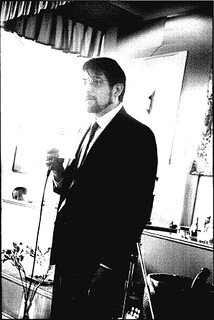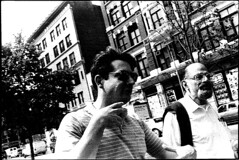 Paula Litsky Bob Rosenthal at Ginsberg’s funeral.
Paula Litsky Bob Rosenthal at Ginsberg’s funeral.It’s the last day of National Poetry Month, so here’s the final installment of our interview with Bob Rosenthal, conducted at Allen Ginsberg’s old 12th Street apartment, where Mr. Rosenthal worked as his secretary for nearly two decades. (Parts one, two, and three of this leisurely conversation ran last week.) As Ginsberg grew older and ill, his assistant followed him to a 14th Street loft purchased from the painter Larry Rivers; when Ginsberg died in 1997, Mr. Rosenthal became executor of the poet’s estate and guardian of one of his last meals.
Allen’s Addictions
Allen always had some pot around – he was a pot propagandist and so if a joint was being passed around and someone was going to take a photograph he would grab the joint so he’s got it. But actually, I rarely ever saw him smoke. He had pot for boyfriends – it’s a good line: “Oh, you want to come up and smoke?” It was really for them. He would go to LSD conventions with the big guys – the Fitz Hugh Ludlow Library guys, Huxley and all those guys. They would give him acid and he would come home and put it in the refrigerator and that was cute. There was a little vial of LSD and it said “Do not take without permission of Allen or Bob” – so I guess Bob had permission. So that was nice. But I never saw him on LSD. Read more…
 Allen Ginsberg Bob Rosenthal, front. Back, from left: Gregory
Allen Ginsberg Bob Rosenthal, front. Back, from left: Gregory
Corso, Shelley Kraut, and Peter Orlovsky holding
Aliah Rosenthal. 1980. .As National Poetry Month winds down, let’s hear more from Bob Rosenthal. Earlier, in the first and then the second installment of our interview conducted at Allen Ginsberg’s former apartment on East 12th Street, where Mr. Rosenthal worked as his secretary for nearly two decades, we heard about Ginsberg’s daily routine, his social sphere, and his love of the East Village. Now, Mr. Rosenthal recalls the poet’s romantic life, his way with strangers, and his tumultuous relationship with Peter Orlovsky – fellow poet, former lover, and longtime companion.
Allen and Peter
Harry Smith would be living here and walking through and making films, and Peter Orlovsky’s brother Julius would be here. I would listen to music and then Julius would say, “Bob, would you like me to turn the music off?” and I’d say, “No, Julius, I’m enjoying this music,” and then 30 seconds later he’d say, “Bob, would you like me to turn this music off?” And after a couple of times I’d say, “Okay, Julius, I have an idea: why don’t you turn the music off?” Denise [Mercedes] and her bandmates would try to get Julius to swear and they’d try to trick him but he was so smart and they could never trick him into saying a swear word. It was really kind of zany. Read more…
 Rosenthal and Ginsberg.
Rosenthal and Ginsberg.Earlier this week, Allen Ginsberg’s secretary of 20 years, Bob Rosenthal, shared memories of his former employer – some of which will be included in a memoir he recently completed, “Straight Around Allen.” Speaking to The Local at Ginsberg’s former apartment on East 12th Street, where the two worked alongside each other for so long, he recalled the great poet’s daily routine, his tastes in literature and music, his mail and telephone communications, and his ways with money. Today, in our second installment, Mr. Rosenthal talks about Ginsberg’s social sphere during his two decades in the so-called poets building. Check back tomorrow for still more from this candid interview.
Allen’s East Village
People would always call Allen and say, “Allen, come to my shangri-la in Hawaii,” and here or there. He would never go. A vacation for Allen was coming back and having nothing to do in the East Village. He would often go to the poetry readings at St. Mark’s. He loved the mushroom barley soup at the Kiev. And The New York Times – he just loved it. He hung around Tompkins Square, wrote a lot of one-line poems about skinheads there. And he was a natural. I think because he always felt free here. Read more…






